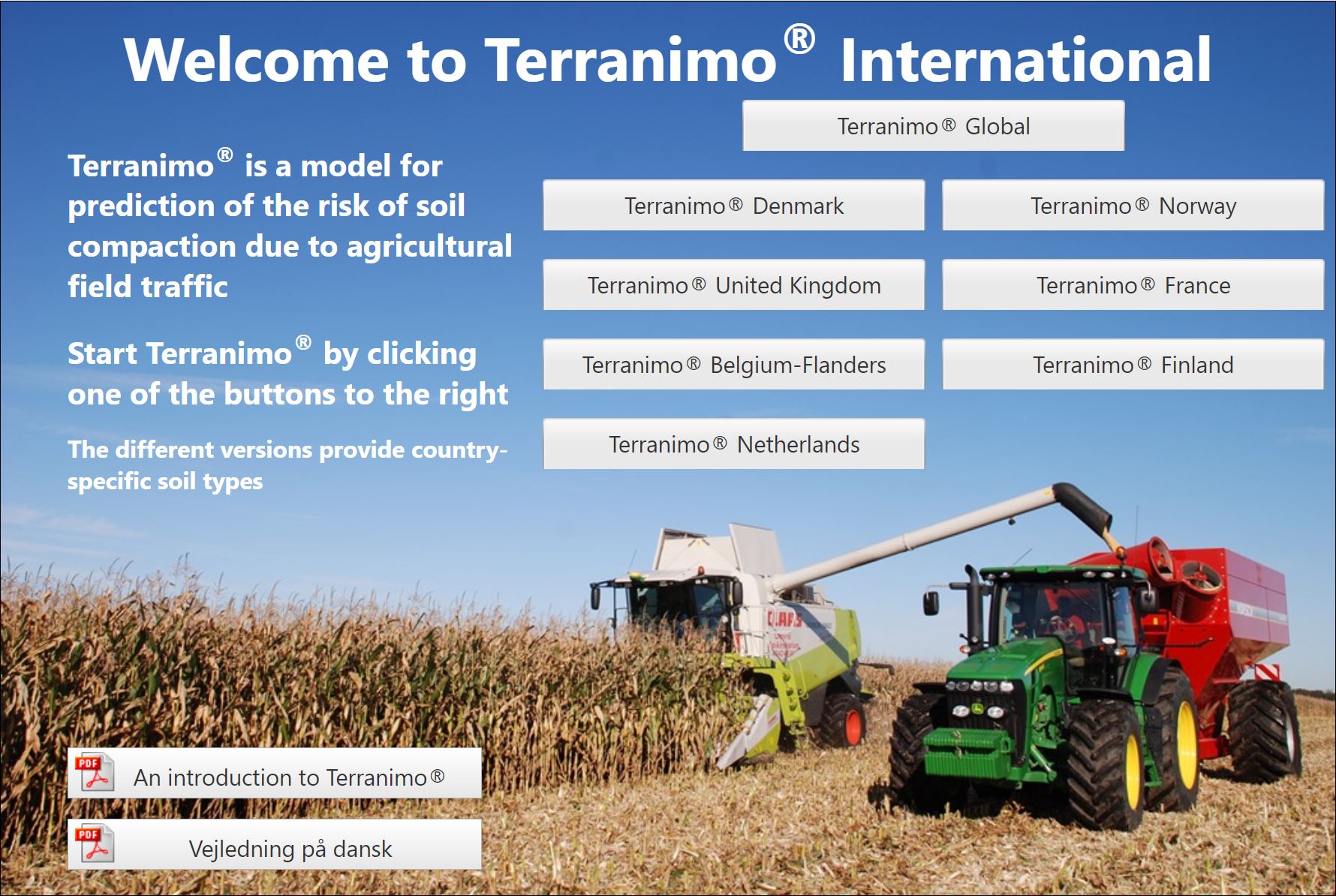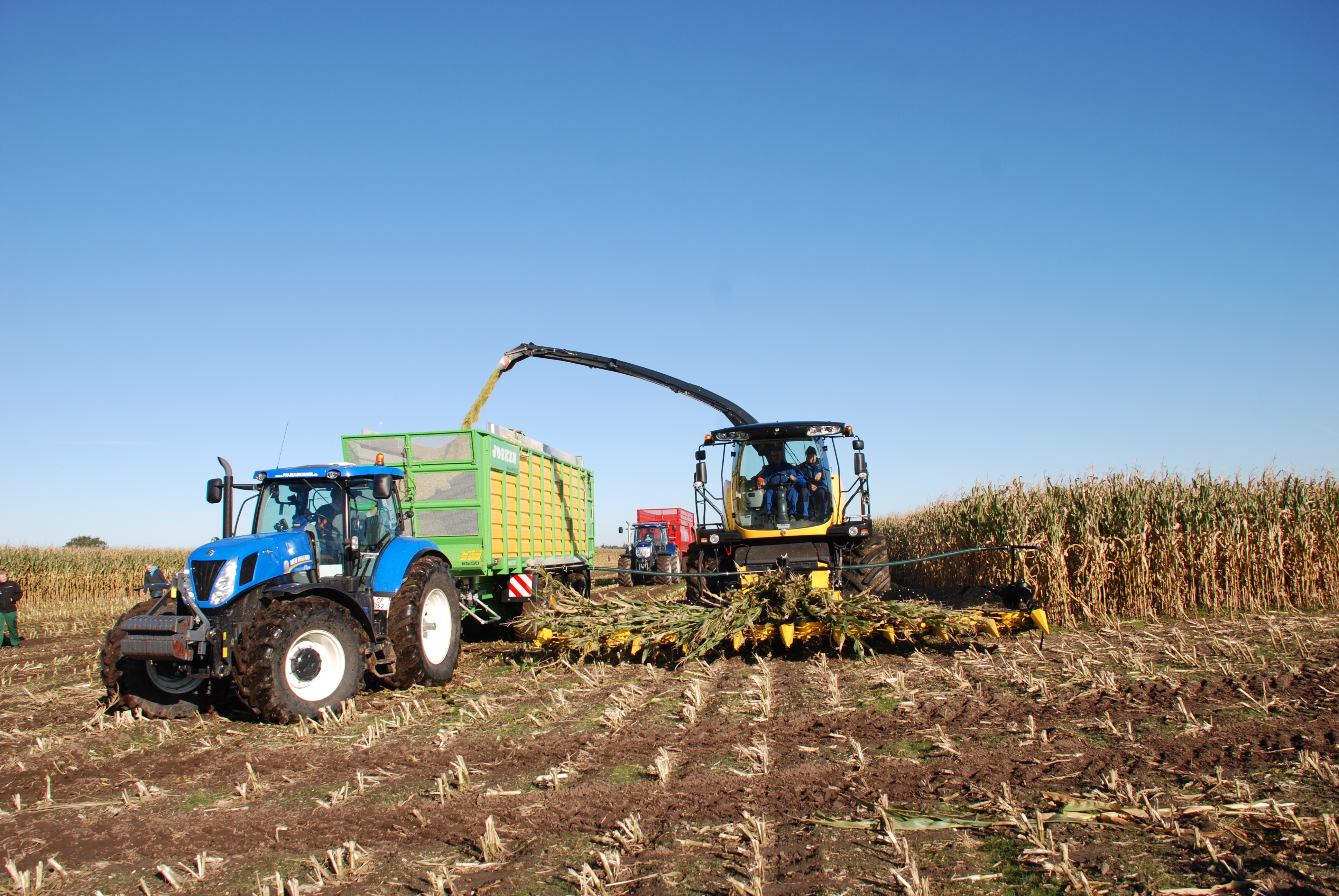SoCoRisk

Introduction
Soil compaction due to traffic with modern agricultural machinery is one of the major threats to soil quality. Ever increasing weights of farm machinery particularly result in compaction of the subsoil (the soil below tillage depth) – subsoil compaction is particularly serious because it is effectively persistent. Compaction adversely affects soil ecosystem services, in particular regulating services (e.g. flood control) and production services (e.g. agricultural production), resulting in significant ecological and economic damage to farmers and society. The aim of this project is to integrate the use of Terranimo®, a decision support tool for prevention of soil compaction, into farmer’s strategic planning. We will use a transdisciplinary approach involving soil scientists, agronomists, and social scientists as well as farmers, contractors, advisers and representatives from authorities. In particular, end-users, i.e. farmers, will have a central role – we will select 4 to 5 farms as case studies in each of the five participating countries (Norway, Sweden, Denmark, Switzerland, and Italy).Within living labs, we will first identify and address potentials and barriers of using Terranimo® along a north-south gradient in Europe, and for a range of farming systems. Based on the identified barriers and potentials, we will develop new ways (e.g. presentation of farm-scale maps of compaction risk) of using Terranimo® for farmers’ decisions. The ambition is to improve farmers’ day-to-day planning of field operations, including hiring of contractors with their respective machinery, and further, to enable strategic planning of investments in new machinery and adjustments to crop rotations based on identification of critical field operations. An immediate output from this project is an improved use of Terranimo® by farmers to reduce the risk of soil compaction. In a longer-term perspective, the improved awareness and sensitivity to soil compaction problems due to Terranimo® decision support may result in a better alignment of crop rotations and farm machinery to sitespecific conditions and may change the design and development of machinery to reduce their negative impact on soil, to help protect our non-renewable soil resource.
Background 
Soil compaction due to traffic with modern agricultural machinery is one of the major threats to soil quality. Ever increasing weights of farm machinery particularly result in compaction of the subsoil (the soil below tillage depth) – subsoil compaction is particularly serious because it is effectively persistent. Compaction adversely affects soil ecosystem services, in particular regulating services (e.g. flood control) and production services (e.g. agricultural production), resulting in significant ecological and economic damage to farmers and society. A decision support system for evaluation of the soil compaction risk during field traffic (Terranimo®, www.terranimo.dk) is freely available online. However, a general use of this tool is still needed.
Main project activities
We will identify and address potentials and barriers of using Terranimo® in its present form in the participating countries along a north-south gradient in Europe in a transdiciplinary approach involving soil scientists, agronomists, and social scientists as well as farmers, contractors, advisers and representatives from authorities. Based on the identified barriers and potentials, we will develop new ways to present the simulation outputs to farmers, and produce recommendations for a successful use of Terranimo® for countries not included in the consortium.

Expected social impact
The whole society will benefit from an improved economic situation of farmers, contractors and machinery manufacturers, and from a reduction of soil compaction with its negative impacts on water bodies (erosion, leaching of nutrients and pesticides, flood) and from a reduction of greenhouse gas emission (denitrification, N2O). Focus on a protecting soil quality has increased in recent years as witnessed by EU initiatives like the RECARE project and by national initiatives. For example, the Danish Government asked for measures to mitigate soil compaction for potential inclusion in the revised CAP.
Implementation and plans to reach target groups
In order to facilitate the use of Terranimo® among farmers, we will evaluate the potentials and barriers of its incorporation into the set of tasks presently needed to comply with political regulation of other management practices (fertilisation planning, use of pesticides). In addition, the results from SoCoRisk will be communicated to potential users in countries that are not directly involved in the project through recommendations for the integration of Terranimo into farmer’s planning strategy regarding different landscape, climate, and farming systems.
Consortium

Coordinated by:
- Mathieu Lamandé - Aarhus University, Denmark,
Partners:
- Francesco Morari - University of Padua, Italy
- Matthias Stettler - Agrifood Technology, Switzerland
- Trond Børresen - Norwegian University of Life Sciences, Norway
- Christian Hansen - SAGRO, Denmark
- Thomas Keller - Swedish University of Agricultural Sciences, Sweden
- Truls O.T. Hansen - Norwegian Agricultural Extension Service, Norway
Funded by:
- Ministry of Environment and Food, Danish AgriFish Agency, Denmark
- Ministry of Agriculture Food and Forestry Policies, Italy
- Federal Office for Agriculture, Switzerland
- The Research Council of Norway, Norway
- The Swedish Research Council Formas, Sweden
Video
News articles
SoCoRisk
Introduction
Soil compaction due to traffic with modern agricultural machinery is one of the major threats to soil quality. Ever increasing weights of farm machinery particularly result in compaction of the subsoil (the soil below tillage depth) – subsoil compaction is particularly serious because it is effectively persistent. Compaction adversely affects soil ecosystem services, in particular regulating services (e.g. flood control) and production services (e.g. agricultural production), resulting in significant ecological and economic damage to farmers and society. The aim of this project is to integrate the use of Terranimo®, a decision support tool for prevention of soil compaction, into farmer’s strategic planning. We will use a transdisciplinary approach involving soil scientists, agronomists, and social scientists as well as farmers, contractors, advisers and representatives from authorities. In particular, end-users, i.e. farmers, will have a central role – we will select 4 to 5 farms as case studies in each of the five participating countries (Norway, Sweden, Denmark, Switzerland, and Italy).Within living labs, we will first identify and address potentials and barriers of using Terranimo® along a north-south gradient in Europe, and for a range of farming systems. Based on the identified barriers and potentials, we will develop new ways (e.g. presentation of farm-scale maps of compaction risk) of using Terranimo® for farmers’ decisions. The ambition is to improve farmers’ day-to-day planning of field operations, including hiring of contractors with their respective machinery, and further, to enable strategic planning of investments in new machinery and adjustments to crop rotations based on identification of critical field operations. An immediate output from this project is an improved use of Terranimo® by farmers to reduce the risk of soil compaction. In a longer-term perspective, the improved awareness and sensitivity to soil compaction problems due to Terranimo® decision support may result in a better alignment of crop rotations and farm machinery to sitespecific conditions and may change the design and development of machinery to reduce their negative impact on soil, to help protect our non-renewable soil resource.
Background
Soil compaction due to traffic with modern agricultural machinery is one of the major threats to soil quality. Ever increasing weights of farm machinery particularly result in compaction of the subsoil (the soil below tillage depth) – subsoil compaction is particularly serious because it is effectively persistent. Compaction adversely affects soil ecosystem services, in particular regulating services (e.g. flood control) and production services (e.g. agricultural production), resulting in significant ecological and economic damage to farmers and society. A decision support system for evaluation of the soil compaction risk during field traffic (Terranimo®, www.terranimo.dk) is freely available online. However, a general use of this tool is still needed.
Main project activities
We will identify and address potentials and barriers of using Terranimo® in its present form in the participating countries along a north-south gradient in Europe in a transdiciplinary approach involving soil scientists, agronomists, and social scientists as well as farmers, contractors, advisers and representatives from authorities. Based on the identified barriers and potentials, we will develop new ways to present the simulation outputs to farmers, and produce recommendations for a successful use of Terranimo® for countries not included in the consortium.
Expected social impact
The whole society will benefit from an improved economic situation of farmers, contractors and machinery manufacturers, and from a reduction of soil compaction with its negative impacts on water bodies (erosion, leaching of nutrients and pesticides, flood) and from a reduction of greenhouse gas emission (denitrification, N2O). Focus on a protecting soil quality has increased in recent years as witnessed by EU initiatives like the RECARE project and by national initiatives. For example, the Danish Government asked for measures to mitigate soil compaction for potential inclusion in the revised CAP.
Implementation and plans to reach target groups
In order to facilitate the use of Terranimo® among farmers, we will evaluate the potentials and barriers of its incorporation into the set of tasks presently needed to comply with political regulation of other management practices (fertilisation planning, use of pesticides). In addition, the results from SoCoRisk will be communicated to potential users in countries that are not directly involved in the project through recommendations for the integration of Terranimo into farmer’s planning strategy regarding different landscape, climate, and farming systems.
Consortium
Coordinated by:
Partners:
Funded by:
Video
News articles